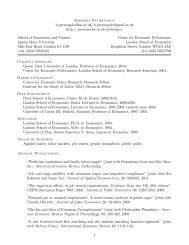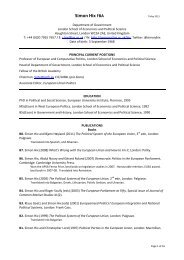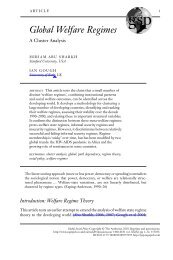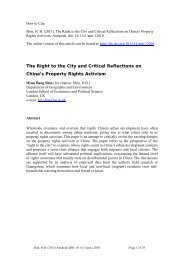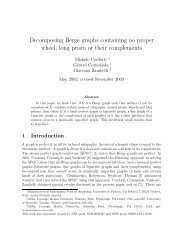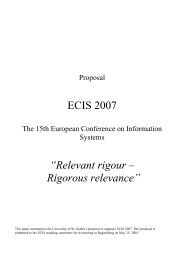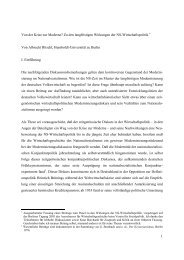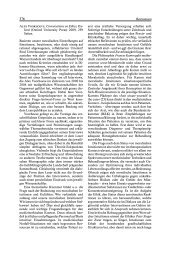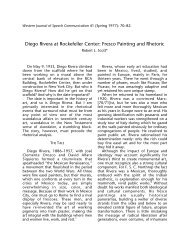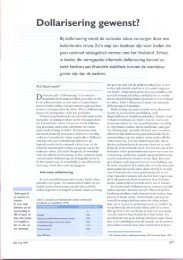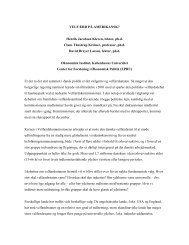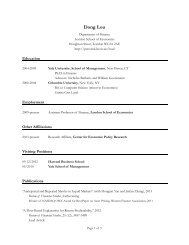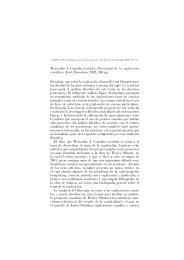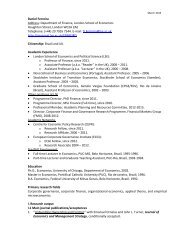The Rejected, the Ejected, and the Dejected: Explaining ...
The Rejected, the Ejected, and the Dejected: Explaining ...
The Rejected, the Ejected, and the Dejected: Explaining ...
You also want an ePaper? Increase the reach of your titles
YUMPU automatically turns print PDFs into web optimized ePapers that Google loves.
Benedetto, Hix / Government Rebels in House of Commons 759<br />
mattered, in that membership of <strong>the</strong> left-wing Socialist Campaign Group<br />
was a significant predictor of voting against <strong>the</strong> government. Similarly,<br />
Garner <strong>and</strong> Letki (2005) found that <strong>the</strong> “isolation” of backbenchers was <strong>the</strong><br />
main cause of rebellion against <strong>the</strong> Blair government in 1997-1999. This isolation<br />
was most prevalent between two types of backbenchers: (a) those who<br />
had been in <strong>the</strong> parliament a long time <strong>and</strong> had not been promoted to ministerial<br />
office <strong>and</strong> (b) those who were on <strong>the</strong> left of <strong>the</strong> parliamentary party.<br />
Hence, even after <strong>the</strong> ab<strong>and</strong>onment of <strong>the</strong> norm that a government defeat<br />
would automatically trigger new elections, existing research suggests that<br />
<strong>the</strong> carrot of ministerial office, <strong>the</strong> nationwide electoral appeal of a unified<br />
party, <strong>and</strong> <strong>the</strong> social norm of loyalty to <strong>the</strong> party were usually sufficient to<br />
ensure highly cohesive governing parties in <strong>the</strong> House of Commons.<br />
Never<strong>the</strong>less, existing research also suggests that when cohesion does<br />
break down, rebels tend to be backbenchers who are unlikely to return to,<br />
or be promoted to, ministerial office, <strong>and</strong>/or MPs on <strong>the</strong> ideological<br />
extremes of governing parties ra<strong>the</strong>r than in <strong>the</strong> center. This later finding is<br />
particularly significant, as it runs counter to <strong>the</strong> st<strong>and</strong>ard spatial model of<br />
legislative behavior, which predicts that centrist MPs are more likely than<br />
extremist MPs to be torn between <strong>the</strong> government’s policy <strong>and</strong> <strong>the</strong> policy<br />
of an opposition party (e.g., Krehbiel, 1993).<br />
Consequently, existing research has identified which types of MPs tend<br />
to rebel in <strong>the</strong> House of Commons. Never<strong>the</strong>less, <strong>the</strong> literature has not identified<br />
<strong>the</strong> precise institutional <strong>and</strong> political conditions that cause <strong>the</strong>se MPs<br />
to rebel when, in general, <strong>the</strong>y remain loyal. This is what we try to do in <strong>the</strong><br />
next section.<br />
A Rationalist <strong>The</strong>ory of Government Rebellions in<br />
Parliamentary Systems<br />
In a parliamentary system, <strong>the</strong> party or parties who form <strong>the</strong> cabinet control<br />
<strong>the</strong> legislative agenda (e.g., Cox & McCubbins, 2005; Huber, 1996a;<br />
Tsebelis, 2002). MPs from nongoverning parties or backbenchers from<br />
governing parties can propose legislation or table amendments, but <strong>the</strong>se<br />
are unlikely to pass without government support. Hence, an MP is more<br />
likely to secure his or her policy preferences if his or her party is in government.<br />
If <strong>the</strong> government falls, ano<strong>the</strong>r cabinet may not include <strong>the</strong> MP’s<br />
party, <strong>and</strong> if a new election is held, <strong>the</strong> MP may not be reelected or his or<br />
her party may not be in <strong>the</strong> government in <strong>the</strong> new Parliament. Hence, one<br />
Downloaded from<br />
http://cps.sagepub.com at SWETS WISE ONLINE CONTENT on July 6, 2007<br />
© 2007 SAGE Publications. All rights reserved. Not for commercial use or unauthorized<br />
distribution.



